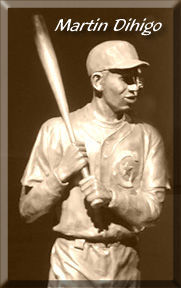
|
Negro Leagues Baseball Museum exhibit
|
"I'm
not concerned with your liking or disliking me... all I ask is that
you respect me as a human being."
"In
the early days, you were always mindful of these things. You tried to
present your best image to the public. This was what Jackie had to do.
We had to do the same thing. Most of the guys coming along in those
days were conscious of this. Management expected this too. A lot of
times, if you didn't project that image, they'd call you a troublemaker.
The next thing you knew, you were out of there, released or sent to
a lower league. We were on pins and needles in the minor leagues. We
didn't speak out on issues because we felt the word would get around
baseball."
"Some
of the things we had to endure down there [in the South] were horrific.
Just maintaining our focus on the field to make it to the major leagues
was a lot. Many of the guys had the ability to advance to the major
leagues, but because of the social conditions we had to endure, they
just fell by the wayside..."
"Jackie
helped us by the manner in which he kept himself in control. He knew
what the price was going to be. We all tried to emulate Jackie, his
demeanor, taking and enduring this to reach our goal, the major leagues.
We had to take abuse, turn the other cheek. All the guys patterned themselves
after Jackie. They may have gotten to the point where they wanted to
quit and they just thought about Jackie. I know I did. That would give
me some sort of lift. We were the early crusaders through the South
and Jackie was with us..."
"We
took long bus trips. Sometimes, we'd make stops along the highway to
eat in a diner. The other players would bring us sandwiches on the bus.
Not only couldn't we eat in the place, we couldn't use the rest room.
We had to relieve ourselves in the bushes. All these things were demeaning.
But we had to endure them."
"The
thing that bothered us the most was occasionally our white counterparts---teammates
and opposing players--might express in subtle ways, sometimes openly,
their racism. This disturbed us more than anything"
The
voice of a white player about being a black baseball player... "I
became aware of how difficult it was to be a black player or black person,
period. Growing up, we were middle-class people. My dad was the kind
of guy who talked about opportunities. You have an opportunity, work
hard, and you get ahead and make something of yourself. My experience
with blacks in the South was they never grew up with this feeling. They
never had the same opportunities I did. They were limited. The worst
part had to be growing up with built-in restrictions. They weren't allowed
to have dreams of uplifting themselves..."
The
voice of a white player about being a black baseball player... "I
never saw any black player who did anything other than put their heads
down, play well, and weather the storm. They had to. If they didn't,
they could get sent home. None of us wanted to go home. Hank Aaron was
very quiet. He would just come, play, and go. I always took this as
some built-in anger. Black players kept the anger inside. A lot of players
I met were like this..." |





